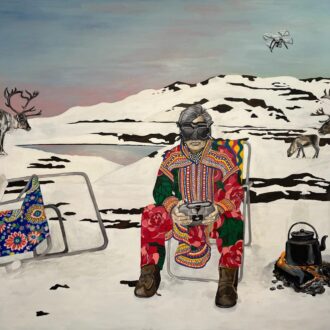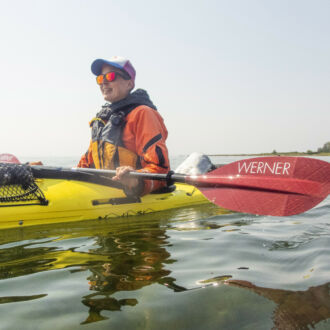Diplomat and negotiator Martti Ahtisaari (1937–2023) won the Nobel Peace Prize in 2008 for his achievements in helping to resolve conflicts in Namibia, the Balkans, Aceh and other troubled areas.
Over the years, former Finnish President Martti Ahtisaari helped bring resolution to conflicts in Africa, Asia and Europe. His untiring work for the cause of peace was rewarded with the 2008 Nobel Peace Prize.
Ahtisaari, who served as president of Finland from 1994 to 2000, received more publicity in international affairs than any other Finn in recent memory, rivalled later only by former prime minister Sanna Marin, who was in office from 2019 to 2023. Upon leaving office, Ahtisaari founded Crisis Management Initiative, where he served as chair of the board.
Great reputation
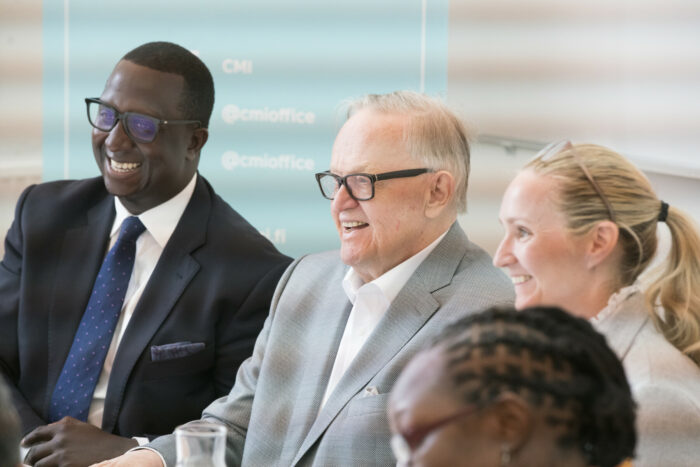
President Ahtisaari joined a meeting of the Joint Steering Committee of the African Union Mediation Support Capacity project in Helsinki in July 2017.Photo: Riku Isohella/CMI
Diplomats, journalists and other informed individuals saw Ahtisaari as straightforward, approachable and considerate. He was well liked in the multicultural environment of the UN, by many different nationalities and on many different levels of the organisation’s hierarchy.
Pragmatic, as a good mediator should be, he employed sound Finnish common sense and a clear vocabulary. He could also be tough when necessary, and spoke the truth openly, even if it meant denting someone’s ego.
To make sure all angles are considered, he was known to employ a method that involved giving his aides an issue to discuss, then listening and selecting the ingredients that could be crafted into a successful proposal.
From teacher to diplomat
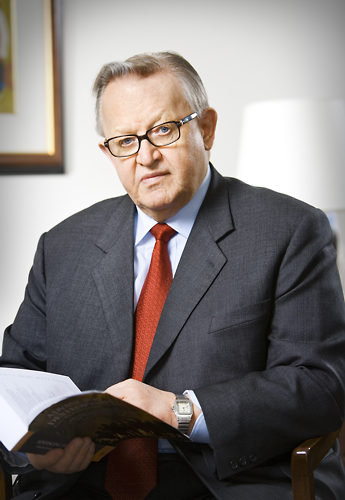
Martti Ahtisaari was born in 1937 in Vyborg, which was part of Finland at the time. He was known for his role in mediation for peace in Kosovo, Aceh and Namibia.Photo: Janne Mikkilä/Studio Blick/CMI
Martti Oiva Kalevi Ahtisaari was born in 1937 in Vyborg (Viipuri in Finnish), a town on the Gulf of Finland that belonged to Finland until 1940, when it was annexed by the Soviet Union. After national service in the late 1950s, Ahtisaari became a teacher and worked in schools in Finland and Pakistan.
From 1965 to 1973, he served in the international development cooperation department of the Finnish Ministry for Foreign Affairs. In 1973, he was appointed ambassador to Tanzania, also accredited to Zambia, Somalia and Mozambique.
From then on, in the words of the Norwegian Nobel Committee, he was to “figure prominently in endeavours to resolve several serious and long-lasting conflicts.” In Tanzania he gained a reputation as a specialist in African politics.
At the request of African leaders, the UN Secretary-General appointed him UN commissioner for Namibia in 1977. The following year, he became the Secretary-General’s special representative for Namibia. In announcing that Ahtisaari had won the 2008 Peace Prize, the Nobel Committee noted that, in 1989 and 1990, he played a significant role in the establishment of Namibia’s independence.
Ahtisaari’s role in the Namibian independence process consisted of coordinating the often diverging positions of the UN, South Africa, the Namibian independence organisation SWAPO, the West and the Soviet Union, while forging an agreement that would be acceptable to all concerned. It took many years before all the pieces of the puzzle fell into place.
The Kosovo challenge
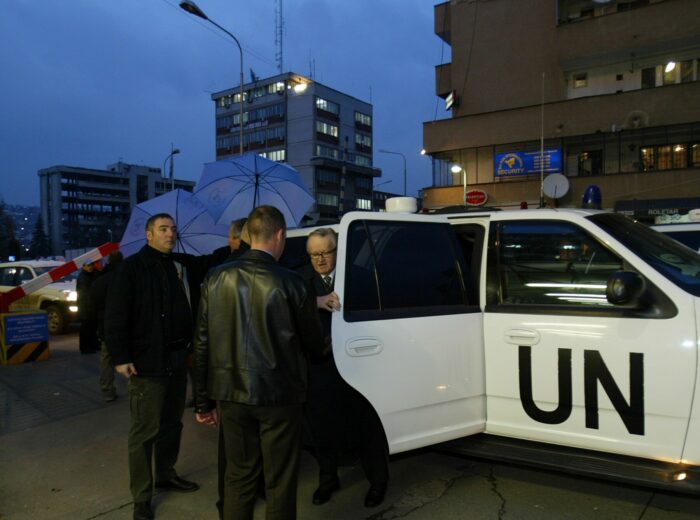
Martti Ahtisaari steps out of a UN vehicle after arriving at UN headquarters in Pristina, Kosovo in November 2005 for a fact-finding mission ahead of crucial negotiations.Photo: Visar Kryeziu/AP/Lehtikuva
In 1999, under notably difficult circumstances, Ahtisaari crafted proposals to resolve conflict in Kosovo. When genocide was under way there, the Nato countries sought to exert pressure on Yugoslavia with an extensive bombing campaign. This did not appear to be enough in itself, and diplomatic efforts were required.
The task consisted of getting the US, its Nato allies, Russia and Yugoslavia to approve an agreement that combined all their minimum demands so that no one would feel they were suffering unduly. This time the challenge lasted only eight weeks, but was all the more hectic for its brevity.
In the autumn of 2005, Ahtisaari again turned his attention to Kosovo. He headed talks on the exceptionally complex topic of the future status of Kosovo.
Assuaging Aceh
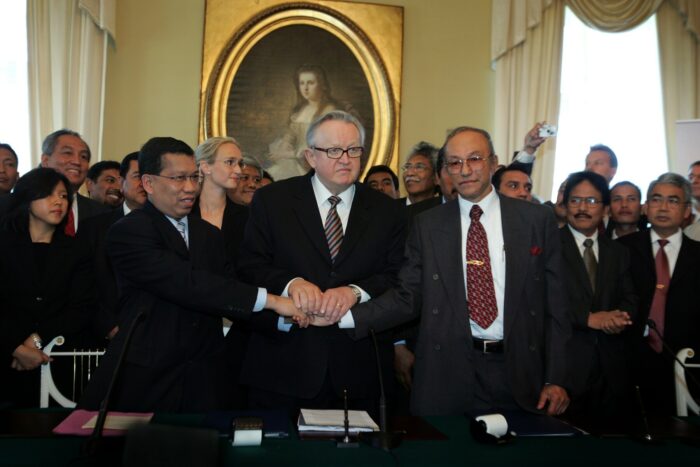
Martti Ahtisaari and his Crisis Management Initiative (CMI) were central to the solution of the complicated matter of the Indonesian province of Aceh’s bid for independence.Photo: Jenni-Justiina Niemi/CMI
The Nobel Committee recalled that in 2005 Ahtisaari and his Crisis Management Initiative (CMI) were central to the solution of the complicated matter of the Indonesian province of Aceh’s bid for independence. CMI was asked to facilitate talks between the Indonesian government and the Free Aceh Movement (GAM).
The first round of negotiations, actually the first face-to-face meeting between the parties since May 2003, took place in Helsinki in January 2005. Subsequent rounds of talks were held in February, April and May.
CMI then prepared a draft Memorandum of Understanding, which formed the basis for a fifth meeting in July. The agreement was signed on August 15, 2005. CMI was also present during the implementation phase.
Several sides to every story

Ahtisaari made significant contributions to settling conflicts in challenging situations all over the world.Photo: Tomas Whitehouse/CMI
Ahtisaari also made exceptional contributions to settling conflicts in Iraq, Northern Ireland, Central Asia and the Horn of Africa. His solutions for international problems were not always to everyone’s liking, of course.
His detractors were particularly uncomfortable with his proposals for the future status of Kosovo. Hinting at such issues, Yuri Deryabin, an eminent Russian diplomatist and former Russian ambassador to Finland, wrote in the Finnish newspaper Kaleva that Ahtisaari had not been awarded the Nobel Prize for the negotiations he had chaired over Kosovo.
Deryabin stated his belief that Ahtisaari had sincerely tried to advance the cause of peace in Kosovo, and added that he doubted whether critics had even read Ahtisaari’s proposals for that area. Ahtisaari had proposed “conditional” independence for Kosovo, which would have guaranteed extensive rights for the Serb minority.
The value of mediation
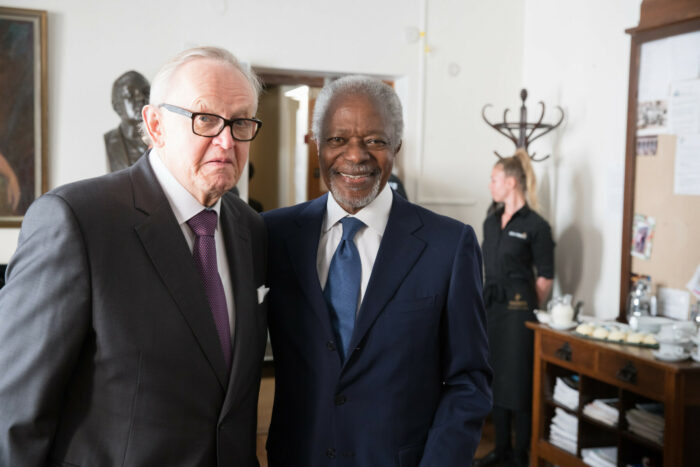
President Ahtisaari and his good friend, former UN Secretary-General Kofi Annan, had a reunion in 2017 at a CMI seminar in Helsinki.Photo: Riku Isohella/CMI
Between the operations in Namibia and Kosovo, Ahtisaari occupied the posts of UN Under-Secretary-General for administration and management, secretary of state at the Finnish Ministry for Foreign Affairs and chair of the Bosnia Working Group of the UN International Conference on the Former Yugoslavia.
He was a member of the board of the New York-based EastWest Institute, as well as a member of the joint advisors’ group for the Open Society Institute and the Soros Foundations, which operate in various countries. He served as chair of the Balkan Children and Youth Foundation and Global Action Council of the International Youth Foundation, as well as chair of the Governing Council of Interpeace.
Until 2003, he was a member of the board of directors of the International Institute for Democracy and Electoral Assistance (IDEA), and until 2004 chair of the Brussels-based International Crisis Group. In October 2008, Ahtisaari was also awarded the Unesco Peace Prize.
Ahtisaari’s Nobel Prize was welcomed in Finland, a country that devotes much brainpower and money to the cause of peace. The Norwegian Nobel Committee referred to him as an outstanding international mediator who showed, through his untiring efforts and good results, the value of mediation in bringing peace to international conflicts.
Martti Ahtisaari died on October 16, 2023, at the age of 86.
By Joseph Brady and Peter Marten, last updated October 2023


